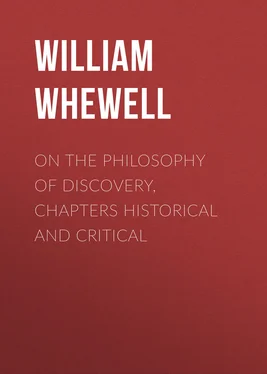William Whewell - On the Philosophy of Discovery, Chapters Historical and Critical
Здесь есть возможность читать онлайн «William Whewell - On the Philosophy of Discovery, Chapters Historical and Critical» — ознакомительный отрывок электронной книги совершенно бесплатно, а после прочтения отрывка купить полную версию. В некоторых случаях можно слушать аудио, скачать через торрент в формате fb2 и присутствует краткое содержание. Жанр: foreign_prose, foreign_religion, Философия, foreign_psychology, foreign_antique, на английском языке. Описание произведения, (предисловие) а так же отзывы посетителей доступны на портале библиотеки ЛибКат.
- Название:On the Philosophy of Discovery, Chapters Historical and Critical
- Автор:
- Жанр:
- Год:неизвестен
- ISBN:нет данных
- Рейтинг книги:5 / 5. Голосов: 1
-
Избранное:Добавить в избранное
- Отзывы:
-
Ваша оценка:
- 100
- 1
- 2
- 3
- 4
- 5
On the Philosophy of Discovery, Chapters Historical and Critical: краткое содержание, описание и аннотация
Предлагаем к чтению аннотацию, описание, краткое содержание или предисловие (зависит от того, что написал сам автор книги «On the Philosophy of Discovery, Chapters Historical and Critical»). Если вы не нашли необходимую информацию о книге — напишите в комментариях, мы постараемся отыскать её.
On the Philosophy of Discovery, Chapters Historical and Critical — читать онлайн ознакомительный отрывок
Ниже представлен текст книги, разбитый по страницам. Система сохранения места последней прочитанной страницы, позволяет с удобством читать онлайн бесплатно книгу «On the Philosophy of Discovery, Chapters Historical and Critical», без необходимости каждый раз заново искать на чём Вы остановились. Поставьте закладку, и сможете в любой момент перейти на страницу, на которой закончили чтение.
Интервал:
Закладка:
Mr. Grote, in his very interesting discussion of Socrates's teaching, notices also 34 34 Hist. of Greece , Part ii. chap. 68.
the teaching of Hippocrates, which he conceives to have in one respect the same tendency as the philosophy of Socrates; namely, to turn away from the vague aggregate of doctrines and guesses which constituted the Physical Philosophy of that time, and to pursue instead a special and more practical course of inquiry: Hippocrates selecting Medicine and Socrates selecting Ethics. By this limitation of their subject, they avoided some of the errors of their predecessors. For, as Mr. Grote has also remarked, "the earlier speculators, Anaxagoras, Empedocles, Democritus, the Pythagoreans, all had still present to their minds the vast and undivided problems which have been transmitted down from the old poets; bending their minds to the invention of some system which would explain them all at once, or assist the imagination in conceiving both how the Kosmos first began and how it continued to move on." There could be no better remedy for this ambitious error of the human mind than to have a definite subject of study, such as the diseases and the health of the human body. Accordingly, we see that the study of medicine did draw its cultivators away from this ancient but unprofitable field. Hippocrates 35 35 De Antiqua Medicina , c. 20.
condemns those who, as Empedocles, set themselves to make out what man was from the beginning, how he began first to exist, and in what manner he was constructed. This is, he says, no part of medicine. In like manner he blames and refutes those who make some simple element, Hot, or Cold, or Moist, or Dry, the cause of diseases, and give medical precepts professing to be founded on this hypothesis.
These passages are marked by the prudence which practical study suggests to a calm and clear-sighted man. They can hardly be said to have opened the way to a Science of Medicine; for in the sense in which we here use the word Science , namely, a collection of general truths inferred from facts by successive discoverers, we have even yet no Science of Medicine. The question with regard to the number and nature of the Elements of which bodies are composed began to be agitated, as we have seen, at a very early period of Greek philosophy, and continued long to be regarded as a chief point of physiological doctrine. In Galen's work we have a treatise entitled, On the Elements according to Hippocrates ; and the writer explains 36 36 Lib. i. c. 9.
that though Hippocrates has not written any work with the title On the Elements , yet that he has in his Treatise on the Nature of Man shown his opinion on that subject. That the doctrine of the Four Elements, Hot, Cold, Moist, Dry, subsisted long in the schools, we have evidence in Galen. He tells us 37 37 De Elem. i. 6.
that when he was a student of nineteen years old a teacher urged this lore upon him, and regarded him as very contentious and perverse, because he offered objections to it. His account of the Dialogue between him and the teacher is curious. But in Hippocrates the doctrine of these four elements is replaced, in a great measure, by the doctrine of the Four Humours of which the human body is constituted; namely, Blood, Phlegm, Yellow Bile and Black Bile. Galen dwells with emphasis upon Hippocrates's proof that there must be more than one such element 38 38 In former editions I have not done justice to this passage.
.
"What," he asks, "is the method of finding the Elements of bodies? There can, in my opinion, be no other than that which was introduced by Hippocrates; namely, we must inquire whether there be only one element, everywhere the same in kind, or whether there are more than one, various and unlike each other. And if the Element be not one only, but several, various and dissimilar, we must inquire in the second place, how many elements there are, and what, and of what kind they are, and how related in their association.
"Now that the First Element is not one only of which both our bodies and those of all other creatures were produced, Hippocrates shows from these considerations. And it is better first to put down his own expressions and then to expound them. 'I assert that if man consisted of one element only he could not fall sick; for there would be nothing which could derange his health, if he were all of one Element.'"
The doctrine of One Element did not prevail much after the time of Hippocrates: the doctrine of Four Elements continued, as I have said, long to hold possession of the Schools, but does not appear as an important part of the doctrine of Hippocrates. The doctrine of the Four Humours (Blood, Phlegm, Yellow Bile and Black Bile) is more peculiarly his, and long retained its place as a principle of physiological Science.
But we are here not so much concerned with his discoveries in medicine as with his views respecting the method of acquiring sound knowledge, and in this respect, as has been said, he recommends by his practice a prudent limitation of the field of inquiry, a rejection of wide, ambitious, general assertions, and a practical study of his proper field.
In ascribing these merits to Hippocrates's medical speculations as to the ethical speculations of his contemporary Socrates, we assign considerable philosophical value to Hippocrates, no less than to Socrates. These merits were at that time the great virtues of physical as well as of ethical philosophy. But, as Mr. Grote well observes, the community of character which then subsisted between the physical and ethical speculations prevailing at that time, ceased to obtain in later times. Indeed, it ceased to exist just at that time, in consequence of the establishment of scientific astronomy by the exertions of Plato and his contemporaries. From that time the Common Sense (as we call it) of a man like Socrates, though it might be a good guide in ethics, was not a good guide in physics. I have shown elsewhere 39 39 Hist. Ind. Sc. Addition to Introduction in Third Edition.
how the Common Sense of Socrates was worthless in matters of astronomy. From that time one of the great intellectual lessons was, that in order to understand the external world, we must indeed observe carefully, but we must also guess boldly. Discovery here required an inventive mind like Plato's to deal with and arrange new and varied facts. But in ethics all the facts were old and familiar, and the generalizations of language by which they were grouped as Virtues and Vices, and the like, were common and well-known words. Here was no room for invention; and thus in the ethical speculations of Socrates or of any other moral teacher, we are not to look for any contributions to the Philosophy of Discovery.
Nor do I find anything on this subject among later Greek writers, beyond the commendation of such intellectual virtues as Hippocrates and Galen, and other medical writers, schooled by the practice of their art, enjoined and praised. But before we quit the ancients I will point out some peculiarities which may be noticed in the Roman disciples of the Greek philosophy.
CHAPTER VII.
The Romans
The Romans had no philosophy but that which they borrowed from the Greeks; and what they thus received, they hardly made entirely their own. The vast and profound question of which we have been speaking, the relation between Existence and our Knowledge of what exists, they never appear to have fathomed, even so far as to discern how wide and deep it is. In the development of the ideas by which nature is to be understood, they went no further than their Greek masters had gone, nor indeed was more to be looked for. And in the practical habit of accumulating observed facts as materials for knowledge, they were much less discriminating and more credulous than their Greek predecessors. The descent from Aristotle to Pliny, in the judiciousness of the authors and the value of their collections of facts, is immense.
Читать дальшеИнтервал:
Закладка:
Похожие книги на «On the Philosophy of Discovery, Chapters Historical and Critical»
Представляем Вашему вниманию похожие книги на «On the Philosophy of Discovery, Chapters Historical and Critical» списком для выбора. Мы отобрали схожую по названию и смыслу литературу в надежде предоставить читателям больше вариантов отыскать новые, интересные, ещё непрочитанные произведения.
Обсуждение, отзывы о книге «On the Philosophy of Discovery, Chapters Historical and Critical» и просто собственные мнения читателей. Оставьте ваши комментарии, напишите, что Вы думаете о произведении, его смысле или главных героях. Укажите что конкретно понравилось, а что нет, и почему Вы так считаете.












